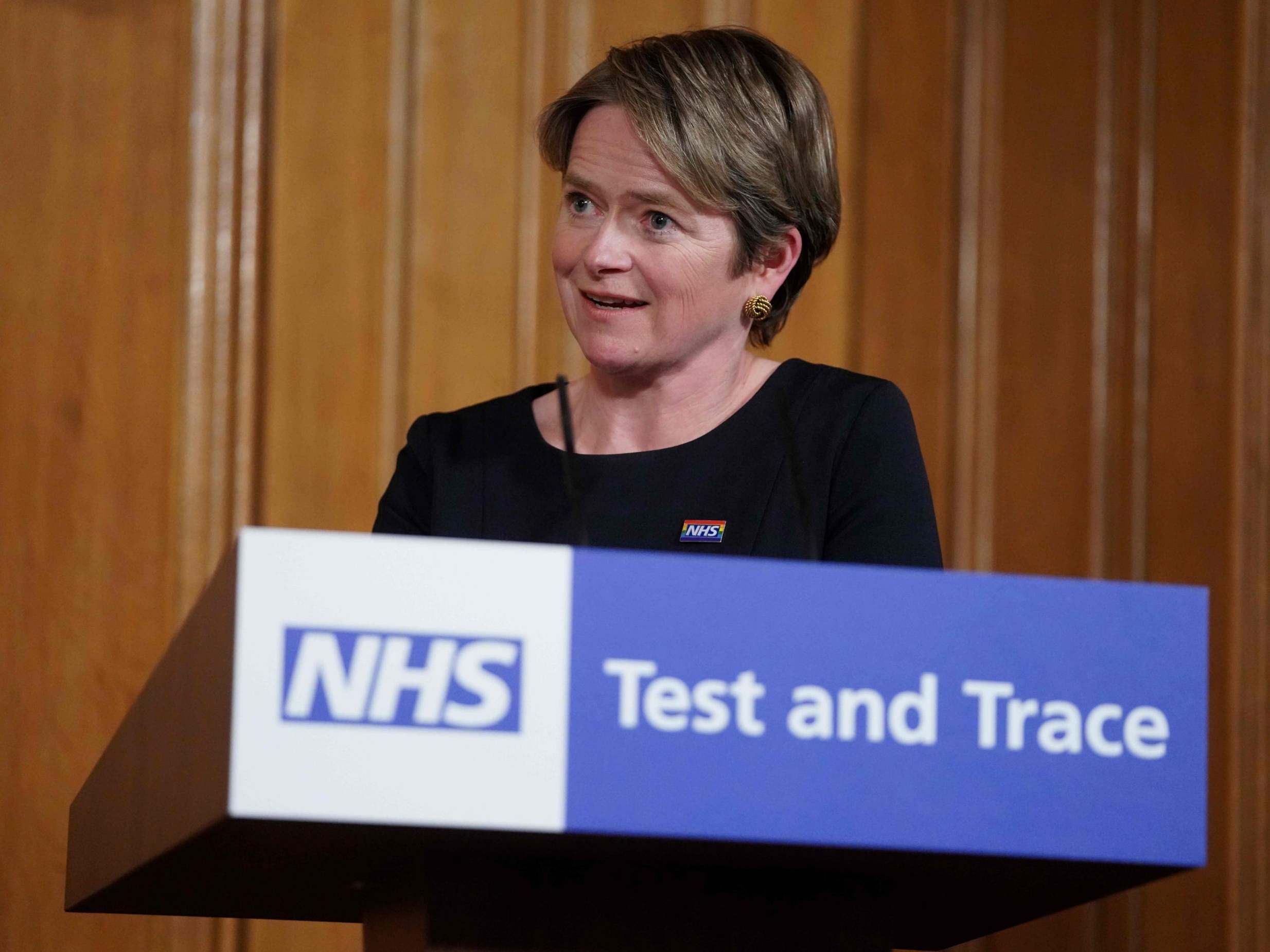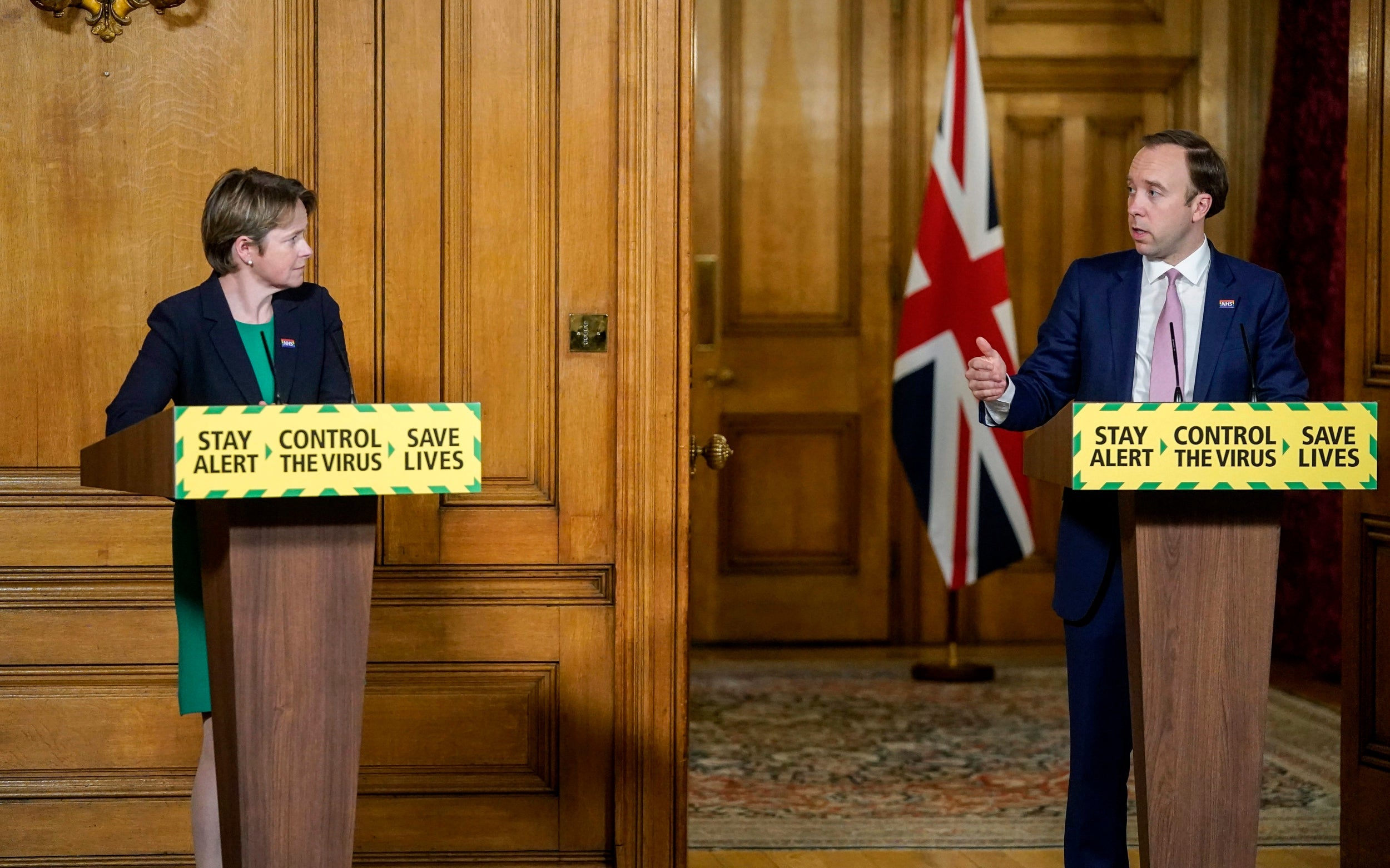Is Dido Harding an inspired choice to join the fight against coronavirus, or another example of Tory cronyism?
From Tesco to TalkTalk to NHS Test and Trace, Baroness Harding’s meteoric rise has not been without controversy, writes Andrew Grice. But is the former jockey the right person to chair the government’s new National Institute for Health Protection?


Remember that I am not a clinician or a scientist,” Dido Harding told the Commons health select committee in June, when answering a tricky question about false positive and false negative tests for coronavirus.
Her critics suspect the 52-year-old Conservative peer of having it both ways. Despite her lack of experience in public health, she was appointed head of NHS Test and Trace in May and this week was handed a bigger job as interim executive chair of the new National Institute for Health Protection. Experts queued up to say the post should have gone to a scientist – as with Germany’s 130 year-old Robert Koch Institute, on which it is modelled. Michael Head, a senior research fellow in global health at Southampton University, said Harding’s appointment “makes about as much sense as Chris Whitty [the chief medical officer] being appointed the Vodafone head of branding and corporate image”.
Labour and the Liberal Democrats claimed Harding would not have been appointed if normal selection procedures had been followed. For now, she is in the post only until next spring. However, she is so highly regarded by Matt Hancock, the health secretary, that few would bet against her landing the job permanently if she wants it. “Brilliant,” “incredibly impressive” and “shows fantastic leadership” are among the plaudits ministers shower on her.
Hancock used a circular argument to justify putting her in charge of the new body, which will merge her test and trace operation with the Joint Biosecurity Centre and Public Health England (PHE), in a move widely seen as scapegoating PHE for mistakes in the early stages of the pandemic in order to protect ministers’ backs.
The health secretary cited Harding’s six months at NHS Test and Trace and three years as head of NHS Improvement overseeing hospitals – both positions she owed to fellow Tories. Although there is some grumbling inside the government about Hancock recruiting “Matt’s mates” – another is Tory peer James Bethell, the health minister – Harding’s high profile helps Boris Johnson answer the charge he has not elevated many women to senior posts. She is seen as “a safe pair of hands” in Downing Street, according to one insider, and has been trusted to front several No 10 press conferences on coronavirus.
Some Tories have dubbed her a “czarina” and Hancock’s “pet poodle”. Indeed, she has provided useful cover for the health secretary; it was she, rather than he, who announced the decision not to proceed with the much-trumpeted mobile phone app trialled on the Isle of Wight. Hancock prefers announcing good news, such as his latest move to “ramp up” testing. It was Harding who coined the phrase, picked up by ministers, that the long-awaited app, now being revamped, would be just “the cherry on the cake” rather than the cake itself.
She doesn’t always stick rigidly to the government script, admitting she was worried that loss of wages might deter some low-paid workers and self-employed people from self-isolating. Yet she would have fewer critics at Westminster had Johnson made her a minister, so she could be held to account more easily in parliament. Tony Blair has described her as “highly capable” but said that a senior minister should be in charge of testing.

Harding has rejected calls to sit as a crossbench rather than a Tory peer given her role as a public official (as others in the same boat have done). Her allies point to her appearances before Lords and Commons select committees, though some frustrated MPs found her less than forthcoming soon after the launch of NHS Test and Trace.
Although clearly not yet the “world-beating” system Johnson promised by 1 June, the jury is still out on the £10bn operation. Naturally, Harding puts the best gloss on its weekly statistics. But it is still falling short of its target to trace and isolate 80 per cent of the contacts of those testing positive for the virus. Thursday’s disappointing figures showed a drop to 71 per cent. Fewer than a third of people in England being tested in the wider population received their results within 24 hours. An IT failure at one laboratory was blamed, causing backlogs in others. It was a setback for Harding, who has set great store by a quick turnaround – vital to limit the spread of the virus.
The contract tracing operation has been widely seen as too centralised. Harding herself talked up the role of local authorities from the start and the hostility to their involvement is believed to have come from her political masters. In a belated U-turn, councils will now play a bigger role and the operation outsourced to Serco and Sitel is being scaled down.
In her expanded role, Harding will come under greater scrutiny and find more brickbats heading her way. She has been through fire before. Her career in business, where she was seen as a high flyer, put her in the eye of a media storm in 2015. As chief executive of TalkTalk, she had to reveal the company had suffered a “significant and sustained cyberattack” affecting four million customers, including 15,000 whose bank details were compromised. The episode cost the firm a £400,000 fine by the Information Commissioner, £60m in lost revenues and 95,000 customers. Although she said sorry in a round of sometimes emotional interviews, Harding’s handling of the episode came under fire. But she hung on to her job. She was still paid £2.8m in 2015, donating her reduced £220,000 bonus to the Ambitious About Autism charity.
She stood down 18 months later to focus on unspecified “public service activities.” She has certainly achieved that goal; bouncing back after the TalkTalk crisis is a sign she should not be underestimated.

Diana Mary Harding grew up in rural Dorset on her family’s pig farm, the daughter of a hereditary peer and granddaughter of a Desert Rats commander in the second world war. After attending a single-sex Catholic private school, she read politics, philosophy and economics at Magdalen College, Oxford, at the same time as David Cameron. It was Cameron who nominated her as a life peer in 2014.
After a spell at the management consultants McKinsey & Company, Harding climbed the corporate ladder at well-known firms including Kingfisher, Thomas Cook, Asda, Tesco and later at J Sainsbury. She is a non-executive director on the Court of the Bank of England and has served on the board of British Land.
At TalkTalk, a third of Harding’s senior team were women. She backed the #MeTooPay campaign for equal pay for women but said the causes of unequal treatment were not always clear-cut: “Ninety-nine out of 100 times you might be being underpaid not because your boss or company is consciously setting out to discriminate.” She has not felt held back by her gender and does not support female quotas on company boards. She has reportedly said workers have too much maternity leave, while acknowledging that as a boss it was easier to juggle her own career and family. She said in 2015: “I make a lot of money – a matter of public record – I have a huge amount of help, and I’m more in control of the day and what I do than someone working shifts on the checkout, or running the produce department in a supermarket.”
She is married to the Tory MP John Penrose, a former tourism, Cabinet Office and Northern Ireland minister and Remainer turned Brexiteer. They met at McKinsey and have two daughters. Her title – Baroness Harding of Winscombe, refers to the village in her husband’s Weston-Super-Mare constituency where they live.
Her impeccable Tory connections have inevitably fuelled claims that she is a beneficiary of cronyism. There are certainly some recurring themes and names on her CV. McKinsey won a £563,400 government contract to advise on the “mission and vision” for the institute Harding now heads. The demise of PHE was called for by the free-market think tank 1828. Her husband sits on its advisory board, although he has distanced himself from its proposals.
Harding’s passion is horse racing, something she shares with Hancock, whose constituency includes Newmarket. An accomplished horsewoman, she was runner-up in a prestigious amateur race at the Cheltenham Festival. Her horse Cool Dawn, an Irish thoroughbred she bought with a £7,000 bank loan with a view to racing him in ladies’ point-to-point, won the Cheltenham Gold Cup in 1998 as a 25-1 outsider.
Harding is on the board of the Jockey Club, the owner of Aintree, home of the Grand National, which is sponsored by Randox Health. Its laboratory division has won coronavirus testing contracts, though there is no suggestion Harding played any role. One Randox home testing kit was withdrawn over safety concerns, after which the government failed to meet its pledge to increase testing in care homes.
Harding promised her husband she would retire as a jockey when she hit 40. She admitted: “Unfortunately, John has made it a marriage-breaking issue that I keep that promise.” Penrose is getting used to being overshadowed by his wife. In a recent BBC interview, the MP was asked if the new test and trace scheme “run by a woman called Dido Harding” would help tackle a coronavirus outbreak at his local hospital. Penrose quipped: “As a matter of disclosure, Dido Harding is my wife.”
Although Penrose might not, the rest of us will be seeing more of Harding over the coming months.
Join our commenting forum
Join thought-provoking conversations, follow other Independent readers and see their replies
Comments
Bookmark popover
Removed from bookmarks